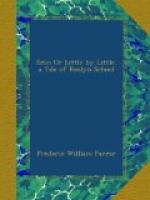The denouement of his history was a tragic one, and had come a few days before the time when, our narrative opens. It was a common practice among the Latin school boys, as I suppose among all boys, to amuse themselves by putting a heavy book on the top of a door left partially ajar, and to cry out “Crown him” as the first luckless youngster who happened to come in received the book thundering on his head. One day, just as the trap had been adroitly laid, Mr. Lawley walked in unexpectedly. The moment he entered the school-room, down came an Ainsworth’s Dictionary on the top of his hat, and the boy, concealed behind the door, unconscious of who the victim was, enunciated with mock gravity, “Crown him! three cheers.”
It took Mr. Lawley a second to raise from his eyebrows the battered hat, and recover from his confusion; the next instant he was springing after the boy who had caused the mishap, and who, knowing the effects of the master’s fury, fled with precipitation. In one minute the offender was caught, and Mr. Lawley’s heavy hand fell recklessly on his ears and back, until he screamed with terror. At last by a tremendous writhe, wrenching himself free, he darted towards the door, and Mr. Lawley, too exhausted to pursue, snatched his large gold watch out of his fob, and hurled it at the boy’s retreating figure. The watch flew through the air;—crash! it had missed its aim, and, striking the wall above the lintel, fell smashed into a thousand shivers.
The sound, the violence of the action, the sight of the broken watch, which was the gift of a cherished friend, instantly woke the master to his senses. The whole school had seen it; they sate there pale and breathless with excitement and awe. The poor man could bear it no longer. He flung himself into his chair, hid his face with his hands, and burst into hysterical tears. It was the outbreak of feelings long pent up. In that instant all his life passed before him—its hopes, its failures, its miseries, its madness. “Yes!” he thought, “I am mad.”
Raising his head, he cried wildly, “Boys, go, I am mad!” and sank again into his former position, rocking himself to and fro. One by one the boys stole out, and he was left alone. The end is soon told. Forced to leave Ayrton, he had no means of earning his daily bread; and the weight of this new anxiety hastening the crisis, the handsome proud scholar became an inmate of the Brerely Lunatic Asylum. A few years afterwards, Eric heard that he was dead. Poor broken human heart! may he rest in peace.
Such was Eric’s first school and schoolmaster. But although he learnt little there, and gained no experience of the character of others or of his own, yet there was one point about Ayrton Latin School, which he never regretted. It was the mixture there of all classes. On those benches gentlemen’s sons sat side by side with plebeians, and no harm, but only good, seemed to come from the intercourse.




